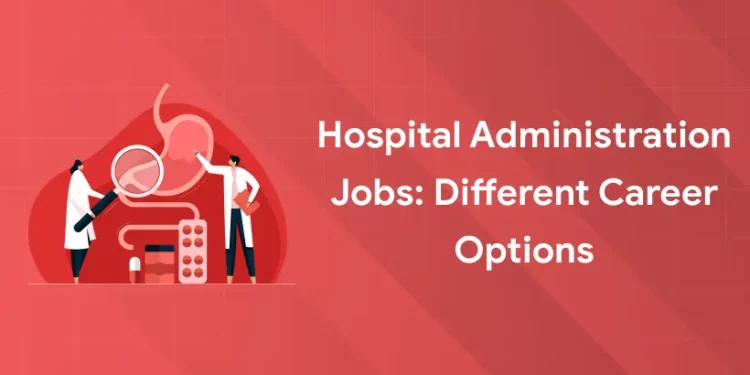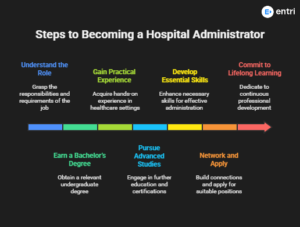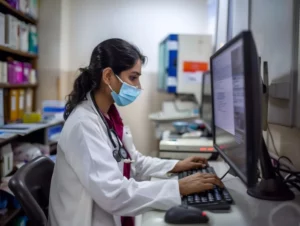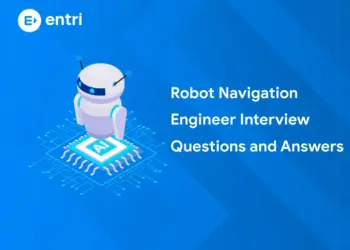Table of Contents
Introduction
Hospital administration is the heartbeat of healthcare institutions, ensuring that everything runs smoothly behind the scenes so patients receive the care they deserve. If you’re passionate about making a positive impact in healthcare—without being on the frontlines as a doctor or nurse—then a career in hospital administration might be a perfect fit.
This field offers not only stable and rewarding job opportunities but also the chance to shape the quality and efficiency of healthcare services that touch countless lives every day. Whether you dream of working in a bustling metropolitan hospital or a community clinic, understanding the variety of hospital administration jobs and the skills you need will set you on the path to a fulfilling career.
Join Entri’s Hospital Administration Course
What is Hospital Administration?
1: What is the primary role of a hospital administrator?
Hospital administration is all about bringing together people, processes, and resources to keep hospitals—and healthcare facilities overall—functioning efficiently and compassionately. Administrators, though often behind the scenes, create the conditions for doctors and nurses to focus fully on patient care.
Responsibilities often include:
-
Keeping comprehensive patient and financial records accurate and accessible
Keeping correct records is a crucial part of a hospital administrator’s job description. This duty requires that each patient’s comprehensive medical records be completed. Receiving and distributing medical test findings is probably the responsibility of a hospital administrator. A hospital administrator handles documentation by adhering to a systematic filing system that guarantees document accessibility.
-
Managing budgets to ensure resources are used wisely
This could have to do with how hospital budgets are managed. They must be able to utilise sound judgement, reason through decisions, and comprehend the principles of budgeting. Effective budget management frequently requires the capacity to recognise and comprehend the financial relationships and impacts of numerous hospital-related variables.
-
Supervising hospital growth and helping create policies that improve care quality
Hospital administrators may be in charge of monitoring hospital development. This may involve enhancing and putting into practice particular policies and processes. They might also find areas for development and carry out quality assurance. A hospital administrator usually assesses their public relations and determines how they may make adjustments while supervising the institution’s development.
-
Coordinating between different departments to provide seamless patient experiences
Organising different hospital services is generally the responsibility of a hospital administrator. They may work with patients and medical staff to coordinate services. When planning services, the hospital administration usually adheres to established protocols. Among the tasks involved in planning hospital services are triaging patients, gathering patient data, authorising admissions, scheduling visits, and arranging protocols.
-
Overseeing recruitment, training, and scheduling so every team member can work at their best
A large number of hospital administrators help with staff hiring and training. Potential applicants may be screened by them through a variety of methods, such as résumé reviews, skill assessments, interviews, reference checks, and internet searches. An administrator of the hospital may be in charge of giving the recruit an outline of the facility, their duties, any probationary periods, and their objectives or aims after selecting a qualified candidate. These experts might also help with the onboarding and training of new hires as well as existing employees.
-
Ensuring the hospital complies with healthcare laws and insurance requirements
A hospital administrator’s main duty is frequently to make sure the hospital they work for complies with all applicable rules and regulations. This may entail keeping an eye on procedures to ensure they adhere to rules set forth by the government. When it comes to establishing insurance reimbursement, they also make sure they adhere to the policies of the insurance company.
Through these efforts, hospital administrators play a vital role in creating a supportive environment where both staff and patients feel cared for.
Read more at: Responsibilities of Hospital Administrators
Hospital Administration Course with Assured Career Growth
Hospital Administration Course by Entri App: Master essential healthcare management skills, gain certification, and secure top roles in leading hospitals
Join Now!Common Hospital Administration Job Titles and What They Do
Your career in hospital administration can take many forms. Here are some of the roles you might find inspiring:
-
Healthcare Administrator: The captain of hospital operations, responsible for budgeting, compliance, and personnel coordination.
-
Healthcare Department Manager: Oversees the day-to-day running of specific departments, ensuring staff and processes run smoothly.
-
Care Manager: Acts as the patient advocate by coordinating treatment plans and communication between medical professionals and patients.
-
Clinical Manager: Supports clinical staff and ensures medical services are executed efficiently.
-
Medical Office Administrator: Manages scheduling, billing, and patient records, making sure the hospital’s paperwork keeps up with care delivery.
-
Hospital Operations Manager: Looks after logistics, facilities, and supplies to make sure the hospital environment is safe and well-equipped.
Each career path offers a chance to contribute in a meaningful way, balancing administrative skill with compassion and teamwork.
Skills and Qualifications Essential for Hospital Administrators
Being successful in hospital administration jobs calls for a mix of practical know-how and genuine people skills:
-
A sound understanding of healthcare systems and legal regulations
-
Ability to manage budgets and financial records with precision
-
Strong leadership skills to motivate and support diverse teams
-
Clear, empathetic communication to connect with hospital staff and patients
-
Comfort with healthcare technologies, including electronic medical records
-
Problem-solving mindset to handle unexpected challenges calmly
-
Organizational skills to juggle multiple responsibilities efficiently
Educational Pathways:
-
A bachelor’s degree in hospital administration, healthcare management, or business administration is typically your stepping stone.
-
Specialized certifications and diplomas can deepen your expertise and boost your career progression.
-
Practical experience, gained through internships or applied training like Entri’s Hospital Administration Course, helps bridge theory with real-world challenges.
Hospital Administration Course with Assured Career Growth
Hospital Administration Course by Entri App: Master essential healthcare management skills, gain certification, and secure top roles in leading hospitals
Join Now!Salary Expectations & Career Growth Opportunities in India and Globally
Hospital administration is not only a profession of impact but also one with growing financial and professional rewards.
-
In India, an average hospital administrator’s salary ranges widely depending on experience and location, from about ₹3.5 lakhs to over ₹8 lakhs annually. Entry-level roles usually start in the ₹2.5 to ₹3 lakh range, which rises steadily with experience and added responsibilities.
-
Research by the U.S. Bureau of Labor Statistics projects a 28% growth rate in healthcare administration jobs from 2022 to 2032—a rate far above many other fields, reflecting urgent and widespread demand [BLS.gov].
-
Globally, expanding healthcare infrastructure, technology integration, and aging populations are creating countless new opportunities wherever you choose to work.
How to Become a Hospital Administrator: Step-by-Step Guide
Pursuing a career as a hospital administrator is a meaningful journey that combines education, practical experience, and continuous skill development. Here’s a clear pathway to help you achieve your goals—enhanced by Entri’s expert-led Hospital Administration Course to give you a solid head start.
Step 1: Understand the Role and Its Requirements
Before diving in, take time to understand what hospital administration truly involves. Hospital administrators ensure that hospitals run smoothly—from managing staff and budgets to coordinating patient services and ensuring compliance with healthcare policies. This role calls for leadership, organizational skills, and a genuine passion for improving healthcare delivery.
You can explore more about these responsibilities through professional networks or introductory courses like Entri’s Hospital Administration Course, which offers a detailed insight into the field.
Step 2: Earn a Relevant Bachelor’s Degree
Most hospital administration careers begin with a bachelor’s degree in fields such as Hospital Administration, Healthcare Management, Public Health, or Business Administration with a healthcare focus. These programs introduce you to essential healthcare systems, management principles, and finance fundamentals.
If you’re looking for a comprehensive option that combines theory with practical insights, the Entri Hospital Administration Course is an excellent next step after your undergraduate studies or even alongside, as it blends classroom learning with hands-on hospital experience.
Step 3: Gain Practical Experience
Real-world experience is invaluable. Seek internships or entry-level roles like Medical Office Assistant or Patient Services Coordinator to familiarize yourself with hospital operations.
Entri’s program goes beyond theory by including a three-month on-the-job training module, enabling you to gain firsthand exposure to hospital workflows, documentation, and patient management. This kind of practical training boosts your confidence and job readiness.
Step 4: Pursue Advanced Studies and Certifications
While a bachelor’s degree lays the groundwork, advancing in hospital administration often requires further education and certifications. Postgraduate diplomas, master’s degrees, or specialized certifications like the Certified Healthcare Administrative Professional (cHAP) can open doors to senior roles.
The Entri Hospital Administration Course also provides targeted coaching and certification preparation that help you stand out in the competitive healthcare job market.
Step 5: Develop Essential Skills
To thrive in hospital administration, cultivate:
-
Strong communication and leadership abilities
-
Problem-solving under pressure
-
Familiarity with healthcare IT, such as Electronic Health Records (EHR)
-
Knowledge of healthcare laws and ethical standards
Entri’s course offers personalized mentoring and focused skill-building sessions that help sharpen these critical competencies, ensuring you’re well-prepared for the demands of the role.
Step 6: Network and Apply for Jobs
Craft a compelling resume highlighting your education and experience. Leverage professional platforms like LinkedIn to connect with industry leaders and attend healthcare job fairs.
Graduates of Entri’s program benefit from career guidance and placement support, increasing their chances of securing fruitful opportunities in reputed hospitals and healthcare institutions.
Also read: Top Hospital Administration Interview Questions and Answers
Step 7: Commit to Lifelong Learning and Growth
Healthcare is ever-evolving, so continuous learning is key. Stay updated with new regulations, technologies, and management trends. Take refresher courses and aim for leadership roles.
Many Entri alumni continue their education through advanced courses offered on the platform, fostering their career growth and expanding their professional horizons.
By following these carefully planned steps—and enrolling in expert programs like the Entri Hospital Administration Course—you can confidently build a fulfilling career managing hospitals that make a real difference in people’s lives.
Emerging Trends Impacting Hospital Administration Careers
Hospital administration is a constantly changing field shaped by the latest healthcare developments and societal needs:
-
Digital healthcare is reshaping hospital operations—from patient records to diagnosis assistance with AI tools—requiring adaptability with technology.
-
The rise of patient-centered care increases focus on communication, satisfaction, and personalized treatment planning.
-
Regulatory landscapes evolve, imposing new compliance and documentation requirements.
-
Emphasis on sustainable and eco-friendly operations invites hospital admins to contribute to environmental goals.
By staying curious and constantly learning, hospital administrators become essential leaders of positive change in healthcare.
Also read: Hospital Administration Career Opportunities Abroad
Why Choose Entri’s Hospital Administration Course?
-
Gain a comprehensive understanding of hospital management, finance, communication, and healthcare technology.
-
Learn from qualified and experienced faculty who bring real-world insights to the classroom.
-
Balance theory with hands-on experience through Entri’s unique three-month training plus three-month on-the-job program.
-
Benefit from personalized mentoring and feedback designed to highlight your strengths and grow your confidence.
-
Receive guidance and preparation for certification exams, ensuring you’re ready to take the next step in your career.
- Additionally, with a dedicated placement cell, Entri’s Hospital Administration Course is your best shot at learning as well as securing a job.
Entri’s course isn’t just about learning—it’s about growing into a healthcare professional who makes a genuine difference.
Conclusion
Choosing a career in hospital administration means stepping into a profession where your work directly touches lives by ensuring that healthcare services run smoothly and compassionately. It’s a role that calls for organization, empathy, and leadership—and offers excellent opportunities for growth in India and around the world.
If you are ready to embark on this meaningful and rewarding journey, consider joining Entri’s Hospital Administration Course to equip yourself with the skills and confidence to succeed.
| Also Read | |
| How to Become a Hospital Administrator | |
| Top Skills Needed for a Successful Career in Hospital Administration | |
| Career Pathways in Hospital and Healthcare Administration |
Hospital Administration Course with Assured Career Growth
Hospital Administration Course by Entri App: Master essential healthcare management skills, gain certification, and secure top roles in leading hospitals
Join Now!Frequently Asked Questions
Why work as a hospital administrator?
The fun part of this job is getting to know some of the patients and learning about their backgrounds and reasons for seeking treatment.
Is hospital administration a good career in India?
The need for hospital management is great. Hospital management positions have high salary ranges. The average pay for a fresh graduate is over five lacs.
What is the scope of hospital administration in India?
Hospital administration professionals are essential to the efficient running of healthcare facilities because they manage staff, finances, and patient care.
What is the scope of hospital administration in India?
Hospital administration is a growing field with increasing demand for skilled professionals who manage the complex demands of hospitals, improving healthcare delivery at all levels.
Is hospital administration a good career in India?
Absolutely. It offers job stability, attractive salaries, and many chances for career progression in both public and private sectors.
What qualifications do I need?
A degree in healthcare or business administration, supplemented by certifications and practical experience, equips you to enter the field confidently.
What entry-level jobs are available?
Roles like Medical Office Administrator, Patient Service Coordinator, and Assistant Hospital Manager are typical starting points.
How much can I earn?
Salaries vary, but fresh graduates typically earn ₹2.5–3 lakhs annually, with potential to grow significantly over time.















